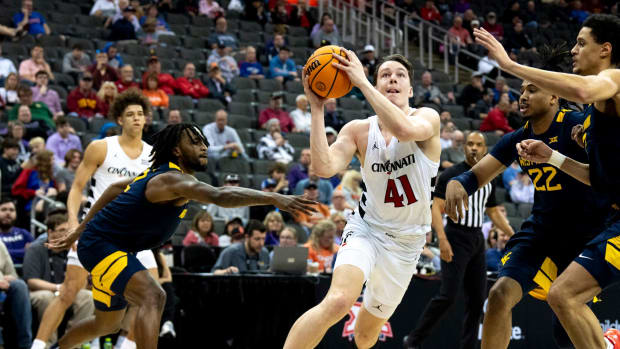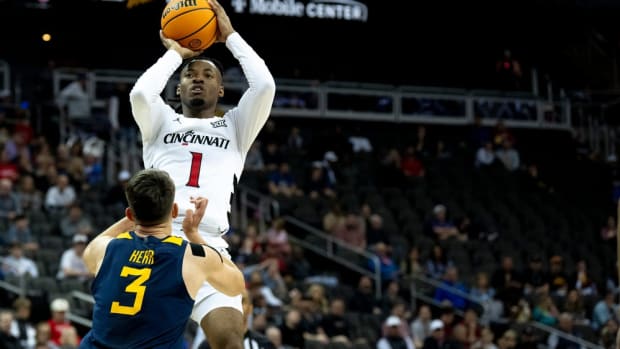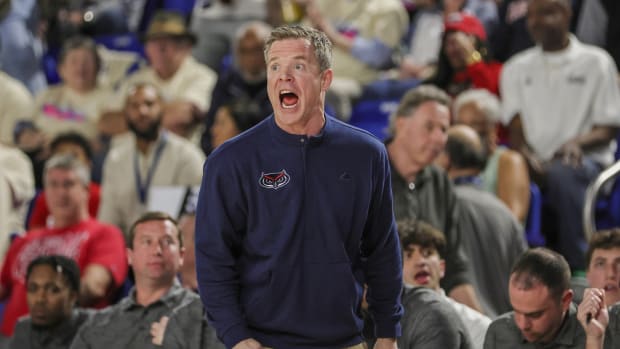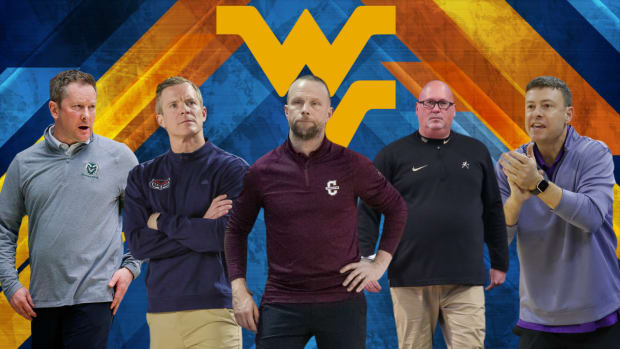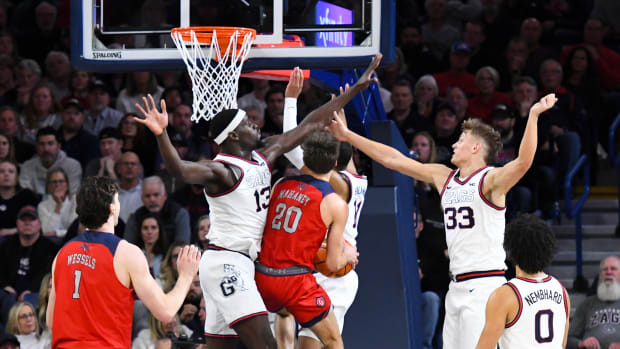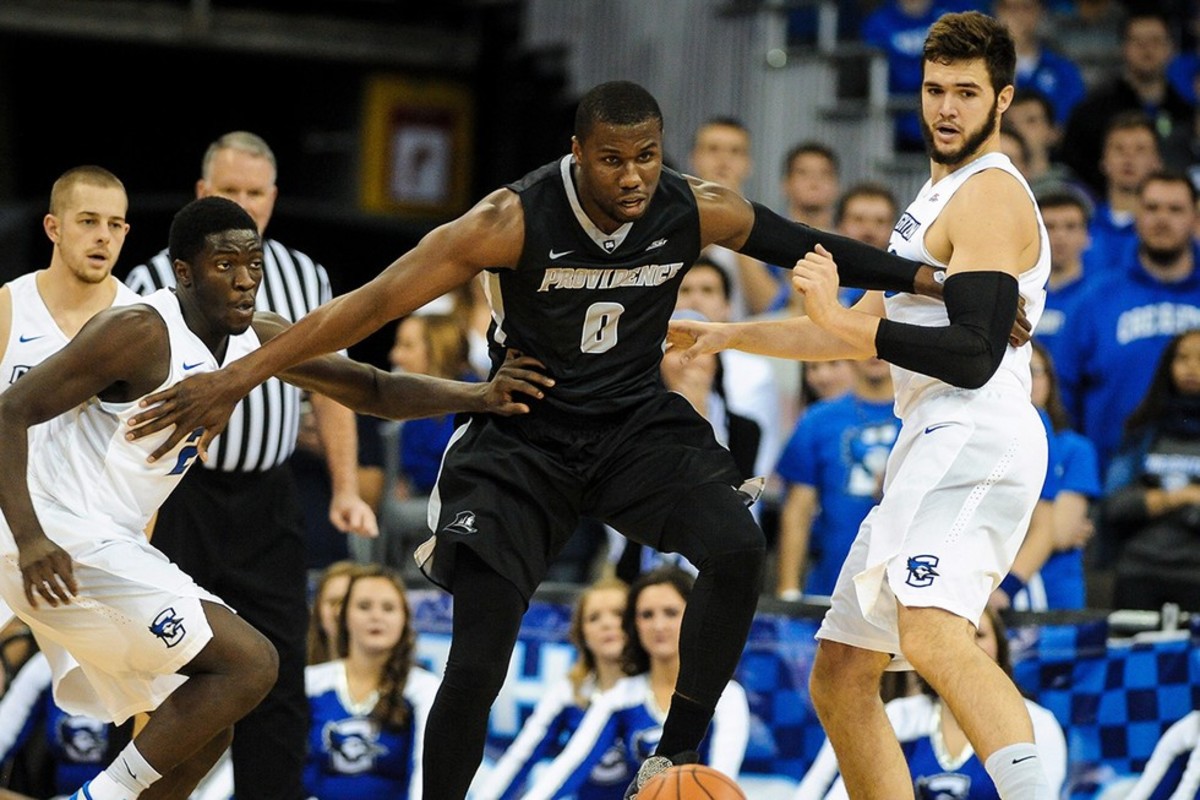
Shootaround: Ghana-born big man Ben Bentil adjusts to life in America, breakout role with Providence
When author Junot Diaz appeared at the St. Andrew's School in Middletown, Del., the event was significant on multiple levels for Ben Bentil, one of the students in the audience. First, Diaz dropped multiple F-bombs, telling the crowd that they probably figured he'd keep it clean, then assuring everyone that no the f--- he would not. Second, Bentil was among those in a small breakout group and was able to ask a question of the Pulitzer Prize-winning author behind his favorite novel: The Brief Wondrous Life of Oscar Wao, a book that chronicles the travails of Oscar De León, an overweight Dominican boy, and his family's assimilation to American culture.
Only four years earlier, when he was 15, Bentil had left friends and family behind in his native Ghana to pursue a better education in the United States. The tension between two cultures depicted in Diaz's book resonated with Bentil, who asked Diaz what originally inspired him to write. The author, a Dominican-American like his protagonist, said he woke up one day, reminisced about his life, and felt compelled to express those experiences through words. Here, too, Bentil felt a connection.
"I had to find my way," Bentil says. "People are curious to know what your country is about, but at the same time, they have to get to know you. I felt like I had to prove myself, that I'm worth it, I'm worth the time, I'm worth the attention."
As he recalled this in a hotel lobby outside of Chicago earlier this week, fresh off the bus from a Providence practice, there was no suspense about his story's ending: The 6' 9" sophomore forward has become one of the nation's most indispensable players, and surely worth everyone's attention. This is clear via the numbers—Bentil's 19.7 points per game leads the Big East—and beyond them. A day after recounting his meeting with Diaz, Bentil twisted his right ankle in the first half against DePaul, limiting him to 14 minutes on the night. The No. 11 Friars suffered a 77–70 upset loss that underscored how much they need both of their All-America candidates (junior do-everything guard Kris Dunn is the other) on the floor to win.
Bentil is listed as day-to-day with a visit from No. 3 Villanova looming Saturday, and Providence prays those days do not pile up. During one of his team's first practices, coach Ed Cooley declared that the nation believed his group to be The Kris Dunn Show—one explosive player and a bunch of anonymous acolytes. Cooley suggested his players should take that personally. Bentil in particular has proven those assumptions wrong. "Can't be where you're at without him," Cooley says. "No way. Not even close."
Should Providence have to cope without one of its stars, it can still use his example of adaptability to improve.
By the time he arrived stateside in 2010, Bentil was equipped with the basics to survive in the U.S—he'd studied English starting at a young age, and his affinity for books derives from digesting tales about Peter Pan and other childhood favorites—but nevertheless caught between cultures. In Ghana, there was a strict procedure to answer questions at school: Raise your right hand and stand when called upon. During an English class early in his time at The Haverford School, which he attended for one year before enrolling at St. Andrew's, Bentil was excited to have the answer to a query from his teacher. Bentil raised his right hand, the instructor called on him, and he duly got to his feet to answer. Then he wondered why everyone was laughing.
"We made a joke out of it for like a week," Bentil says. "Two of my friends started doing it."
The adjustments were abundant. Bentil craved the weather of home, the time at the beach, the food. He longed for his mother's cooking, especially his favorite dish, fufu, a Ghanian staple made with cassava flour. "I was used to that rich, organic stuff, straight from the farms," he says, "instead of all this food with all the chemicals going through the machines." He specifically recalls cringing at cheese lasagna, and complaining without end to his mother, Ursula, about his diet. Her reply was clear: You went there for a mission, Ursula said. You better take advantage of whatever it takes to get that done.
Chris Szagola/AP
He would, becoming a top-100 recruit in the class of 2014, according to Rivals and Scout. In Bentil's first college practice, Cooley saw enough speed and toughness and ability to move bodies that he was sure there was an all-conference performer in the making. Bentil slid into the Friars' starting lineup nine games into his freshman season, but some inconsistencies remained. Slow development in defensive positioning led to foul trouble, which led to Bentil missing out on minutes that could hasten his development. (He didn't log 30 minutes in a game until Feb. 4 of his freshman year, then did so in six of the 11 games after that.) To Cooley, the gradual ascent in smarter play and Bentil's four double-doubles in his last eight games presaged what was to come. "A lot of people didn't see it, because you had LaDontae (Henton), you had Kris, and he was just overshadowed," Cooley says. "But once he was put in a different role, the sky was the limit."
Still, that demanded more tweaks, more transformation. "I wanted to be able to guard everybody on the court," Bentil says. He dove into an off-season program aimed at improving his lateral quickness and explosiveness, replete with box jumps and squats and workouts in the pool. The more figurative leap in offensive production—Bentil averaged just 6.4 points as a freshman—was a matter of comfort and trust built over time. He shot 3-of-14 in the 2015–16 season opener against Harvard and found his Friars teammates dismissing it as an aberration, even as it was happening. Bentil scored just eight points that night; he has only two single-digit efforts since then, including the injury-shortened six-pointer against DePaul on Wednesday.
"I slowed down," Bentil says. "I watch film, and it looks like I'm going 100 miles per hour. But to me, I feel like I'm going 50. Coach always said, if I slowed down, it's just going to come to me. I'm going to catch better, be in the right position at the right time, and just finish."
Providence prefers Bentil to attack—he shoots 81.9% from the free-throw line—but he has hit 20 three-pointers and is at 1.016 points per possession in spot-up scenarios, per Synergy Sports Data, good for the 70th percentile nationally. "He's been what we thought he would become, a little bit sooner than we thought," Cooley says. "Very tough to guard because of his energy, toughness and skill. Rim to rim, one of the fastest dudes in the country. He's a position-less guy, because a five-man can't guard him, and a four-man is too small."
It is a package the Friars can't do without. During the team's midday shootaround before the DePaul game, Bentil flexed after hitting a layup against no one then let out a little yelp after a put-back of a miss against, again, no one. When the team broke out for an individual shooting period, Jalen Lindsey, a sophomore guard sitting out due to illness, rolled a ball toward his classmate. Bentil chastised Lindsey for touching the ball, catching it in his practice jersey and wiping it down before taking off down the floor.
Bentil's enthusiasm is as necessary as his production. Before Providence left that shootaround, Cooley implored his team to manufacture its own energy in what would be a mostly empty Allstate Arena that night. (Even the paltry listed attendance of 5,114 seemed generous.) Sure enough, once Bentil was lost for the night to the ankle injury, the Friars appeared to lose their verve. Dunn especially looked worn down by the end, missing 15 of 20 shots and bending over with his hands on his knees at the final buzzer. "We don't have a lot of people in the frontcourt at his status," Dunn says.
When Bentil walked across campus last year with Henton, the Friars' All-Big East forward and honorable mention All-America in 2014–15, he took note that even professors would yell "Buckets!" at the standout senior, shouting Henton's nickname to get his attention.
"That's when it clicked," Bentil says. "I want to have that much respect."
He wanted to be a name on the scouting report with a star next to it. And he knew that would require acclimating to another new world, one in which Providence's fortunes rested on his wits and abilities. Now, few teams need a player as much as the Friars need Ben Bentil.
But they can take a lesson from him and work to survive in his absence, if any. It can be done, as strange as it may feel. Consider, after all, the post-practice meal that Providence's star forward wolfed down earlier this week on the way back to his hotel—lasagna.
"You have to adapt," Bentil says. "You have to go with what you got."
G Flume/Getty
Starting Fives
The five best games of the weekend:
No. 18 Purdue at No. 9 Maryland (Saturday, 4 p.m., ESPN). According to kenpom.com, we have the No. 13 team in the country visiting No. 9. Both sides have the rare frontcourt depth to match the other.
No. 2 North Carolina at Notre Dame (Saturday, 4 p.m., ESPN.. The nation's fourth-most efficient offense visits the nation's most efficient offense. Double 100s in regulation? As long as the Tar Heels' shooting is worth more than a blankety-blank.
No. 25 South Carolina at No. 8 Texas A&M (Saturday, 4 p.m., ESPNU). If only because the Gamecocks have played zero teams in the RPI top 25, entering a stretch in which they face the Aggies, LSU and Kentucky. (LSU is not in the RPI top 25, but, you know, Ben Simmons.)
No. 15 Baylor at No. 14 West Virginia (Saturday, 8 p.m., ESPN2). The Bears rank 13th nationally in steal percentage (12.2). The Mountaineers rank first (14.6). I am hoping for a series of steals upon steals set to the Benny Hill theme.
Utah at No. 16 Oregon (Sunday, 4 p.m., ESPN2). The Pac-12 is exceptionally weird, but here's a pretty straightforward showdown between the league frontrunners (the Ducks) and the team that is two games behind them in the standings.
The five best restaurants in Chicago that I have been to which aren't fancy but are awesome:
Longman & Eagle: Non-descript corner joint on the outside. Varied, accessible Michelin-starred menu and copious whiskey selection on the inside.
Trenchermen: Never a disappointment. Sit at a high top on the bar side, start with pickle tots and go from there.
Girl and the Goat: Yes, you'll have to eat at 4 p.m. or 10 p.m., but it is worth it ... at least once.
Au Cheval: The burger. My sweet heaven, the burger.
Owen & Engine: Fish and chips, freshly made, and made as well as across the pond.
(Sixth Man: Smoque. Get the brisket. Revel in the brisket.)
Getty Images
Two on Two
Each week, The Shootaround will talk to a pair of assistant coaches for a brief scouting report on a key upcoming matchup. This week, the players in focus are Washington senior guard Andrew Andrews (20.6 points per game) and Arizona senior guard Gabe York (14.5 ppg). The Wildcats visit the Huskies Saturday at 4:30 p.m. on Fox.
Raphael Chillious, Washington assistant coach: "From his freshman year to now, [Gabe York] has become a pretty complete player. Before he was primarily a jump-shooter, and if you cut off the three, it was a little harder for him to score and he needed some help to get shots. Now, he's good enough to beat you off the bounce or with a deep three. He's what we call a 'Combo Plus'-type player. He's not a high assist rate guy, but he can make plays for others now. Clearly, not having [freshman guard Allonzo] Trier, somebody has to take more shots. And typically you want somebody who can make more shots taking more shots. The biggest challenge with Gabe York is knowing where he is at all times in transition. Arizona is not a high-possession team, typically, but they do have a hard push on makes and misses. If you don't know where he is, he has the green light to pull from the hash. We're still primarily freshmen. And sometimes it's easy to lose a guy in the wash. You have to dial in and make sure he gets little, if any, open shots. [Arizona coach] Sean [Miller] runs so much good stuff where he can get shots, that's easier said than done."
Mark Phelps, Arizona assistant coach: "[Andrew Andrews] is a problem. He's a combination of a really fast guard and a really strong, elusive tailback. He comes downhill at all times. He changes directions at full speed better than just about anybody I've seen. And he puts fouls on you; in league play, he's averaging 11 free throw attempts. He scores at all three levels—he gets to the rim, mid-range he can stop on a dime and pull up, and obviously he can knock down threes. He rebounds and he rebounds at both ends. It's kind of awkward to always be worried about blocking out a guard when you're a guard. And he's really effective when he gets a defensive rebound and starts the break. He gets to full speed in about two steps. He's got a very tight handle with the ball—if you do happen to guess right and get in front of him, he'll spin and go behind his back. You can't guard him with one guy. You have to have a lot of gap help and five-man awareness of where he is. Everyone has great intentions of actually getting back in transition and stopping the ball early and building walls and all that stuff—he ruins your best intentions a lot of times."
Court of Opinion
Fact: Every college basketball player wants to play in the NBA. Also fact: You don't have to discuss every player's value in the context of his professional future. Seriously. Just don't write about it or talk about it. You can do this. And it doesn't make you a Pollyanna. It makes you someone who wants to watch a college basketball game, not a tryout.
Traveling calls
It was a standard ride in the Hertz shuttle from the Detroit airport terminal, except for the man driving the shuttle. He was playing very loud music and singing even louder over it. I planned to accidentally hurl my carry-on suitcase into the radio console during the short trip, and then Melvin the shuttle bus driver explained himself.
"This is my eight hours of rehearsal time," he told us.
At this point, I felt bad about wanting to destroy Melvin's radio. There was no fighting it: You can get down on the Hertz shuttle, or you can get off.



